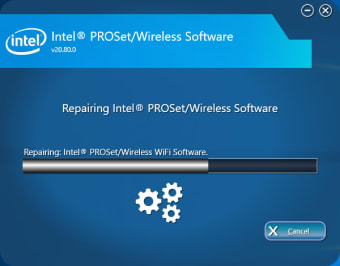Intel PRO/Wireless and WiFi Link Drivers Win7 64-bit for Windows explained
Screenshots
The Intel PRO/Wireless and WiFi Link Drivers Win7 64-bit for Windows serve as essential software components designed to ensure the efficient functionality of Intel's wireless network adapters on systems running the Windows 7 operating system with a 64-bit architecture. These drivers establish a crucial link between the network adapters and the operating system, enabling users to connect to and utilize wireless networks seamlessly.
Everything you need to know about Intel PRO/Wireless and WiFi Link Drivers Win7 64-bit for Windows
The Intel PRO/Wireless and WiFi Link Drivers Win7 64-bit for Windows refer to a specialized set of software components provided by Intel. These drivers are specifically designed and tailored for computers running the Windows 7 operating system on a 64-bit architecture.
The primary function of these drivers is to facilitate the optimal operation and performance of Intel's PRO/Wireless and WiFi Link network adapters within the Windows 7 environment on 64-bit systems.
These drivers establish a communication link between the Intel wireless network adapters and the Windows 7 (64-bit) operating system. They enable users to seamlessly connect to and utilize wireless networks, ensuring efficient data transmission and network access.
These drivers are specifically crafted for systems operating on a 64-bit architecture running Windows 7. They are intended to support and enhance the functionality of Intel's range of wireless adapters within this specific OS environment.
Users can download and install these drivers onto their systems to ensure that their Intel wireless network adapters function optimally. Regularly checking for updates from Intel is recommended to ensure that the drivers remain current and potentially address any issues or security vulnerabilities.
These drivers are part of Intel's support ecosystem, which provides essential software updates, bug fixes, and optimizations for their network adapters. However, similarly to other driver versions, there might be an end-of-life stage, leading to the cessation of further updates or support for certain versions.
Technical information
Here’s what you need to know about the Intel PRO/Wireless drivers:
- Network Standards: The drivers work with 802.11a/b/g networks. These are common and widely used.
- Security: The drivers help improve security. They reduce the risk of unauthorized people intercepting your internet connection.
- Frequency: The drivers support both 2.4 GHz and 5 GHz wireless frequencies. This makes them versatile for different types of wireless environments.
- Compatibility: These drivers are only for 32-bit versions of Windows 7.
- Updates: The last update for these drivers was in May 2017. This means they are up to date with the latest security and performance improvements.
Does Windows 7 still support Wi-Fi?
Windows 7 still supports Wi-Fi, which means you can connect to the internet. You can connect through:
- Wi-Fi Hotspots: You can use free public Wi-Fi available in places like cafes and libraries.
- Home Networks: You can connect through a Wi-Fi or Ethernet connection that goes to your own modem or router. This modem or router should be linked to a service that you pay for.
Windows 7's support for Wi-Fi ensures that users with this older system can still access modern internet services.
What is the best WiFi driver for Windows 7?
Choosing the best WiFi driver for Windows 7 depends on your computer and needs. Here are some top options:
- Intel PROSet/Wireless WiFi Software: This is generally recommended for its strong performance.
- Intel PROSet for Intel WiMAX/WiFi Link 5150 & 5350: These are good if you need WiMAX technology along with Wi-Fi.
- Intel WiFi Link 4965: This is a solid choice if you have older hardware.
- Dell Wireless 1703/1705 WiFi Driver: This driver works best for certain Dell computers.
Intel WLAN Driver for Lenovo G400s and G500s:
This is designed specifically for these Lenovo laptop models.
How to update Win7 64-bit devices
Updating devices on Windows 7 64-bit involves using Windows Update for system patches and some drivers. Access it via Control Panel > System and Security > Windows Update. In Device Manager, check for driver updates by right-clicking on specific devices. Visit the manufacturer's website for hardware updates, downloading and installing the latest drivers for your system. Employ reputable third-party tools cautiously for automated updates. Keep security software up to date for system protection.
Given Windows 7's end-of-life status, transitioning to a newer OS like Windows 10 or 11 ensures ongoing support. Manually update other software by checking respective websites. Back up crucial files before updates to prevent data loss. Remember, concise, regular updates are crucial for system functionality, performance, and security.
Should you download it?
The Intel PRO/Wireless and WiFi Link Drivers Win7 64-bit for Windows stand as crucial components, fostering seamless connectivity between Intel's wireless network adapters and the Windows 7 64-bit environment.
These specialized drivers serve to optimize performance, ensuring efficient data transmission and enabling users to connect effortlessly to wireless networks. Regular updates, primarily through Windows Update and the manufacturer's website, are imperative to maintain functionality and security. However, with Windows 7 reaching its end-of-life, considering an upgrade to a newer operating system becomes increasingly vital for continued support and enhanced features.
Embracing these drivers for Windows 7 64-bit signifies a commitment to efficient wireless networking, although transitioning to a newer OS remains a proactive step for sustained functionality and security in the evolving digital landscape.

